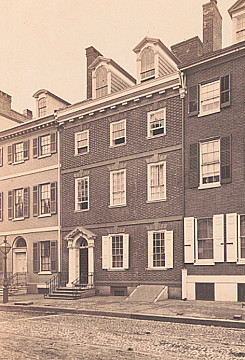William Bingham (1723-1769)
Merchant, of Pine Street, Philadelphia
He was the only surviving son of his father through whom he inherited considerable property in and around Philadelphia. His mother was a first cousin of Mary (Budd) Allen, mother of the Chief Justice of Pennsylvania, William Allen. He served as an Ensign in the French & Indian War and became profitably engaged in the West Indian rum trade with his brother-in-law, Joseph Stamper. In 1745, he married Molly ("whose attractions were referred to very enthusiastically by William Black"), daughter of John Stamper, Mayor of Philadelphia, who built them the house in which they lived at 224 Pine Street: "distinguished by its red-and-blue glazed brick, its ancient columnar doorway, and its low steps. The interior of the house was finished... with elaborate panelling, wainscoting, heavy doors etc.". The coach-house and stables were located on Stamper's Alley and the parlor (to what is now more usually called the Blackwell House) is now on display at Winterthur. The Bingham's son, William, was reckoned to be the most powerful man in the country during the Revolutionary era.





